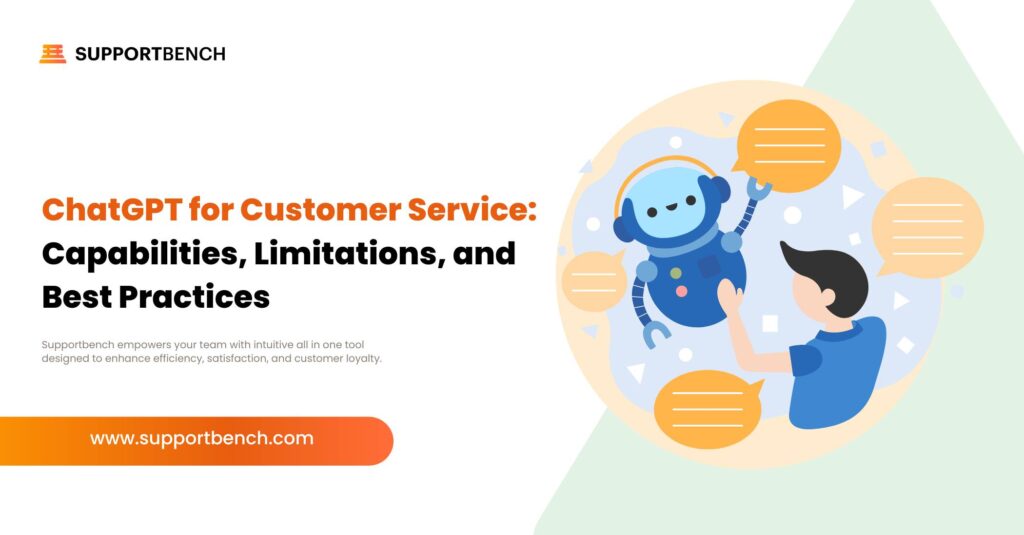In the fast-paced business world, the rise of artificial intelligence (AI) tools like ChatGPT has sparked curiosity about how these tools can revolutionize customer service. Since its launch in 2022, ChatGPT has shown its potential to automate and streamline various tasks across industries. But when it comes to customer service, how effective is ChatGPT in addressing the unique demands of this field?
Dealing with customer inquiries efficiently is critical for businesses aiming to maintain positive customer relationships. Providing fast, accurate, and empathetic responses can directly impact customer satisfaction and loyalty. However, it’s essential to understand how AI, specifically ChatGPT, fits into this dynamic.
This article explores the capabilities and limitations of ChatGPT in customer service and provides actionable insights on how businesses can leverage this powerful AI tool while staying mindful of its constraints. We’ll also delve into how tools like Supportbench can help manage AI-enhanced customer service strategies.
The Importance of Efficient Customer Service
Customer service is the heart of any business, responsible for managing relationships and ensuring customer satisfaction. When done right, it helps resolve issues quickly and keeps customers loyal. However, as businesses scale, customer service teams often struggle with handling large volumes of inquiries, which can lead to delays, miscommunication, or even frustration on both ends.
This is where AI, specifically tools like ChatGPT, can make a significant impact. The ability of AI to automate responses, summarize information, and assist with common queries can free up time for human agents to handle more complex situations.
AI’s role in customer service has grown, but it’s crucial to recognize the balance between automation and human intervention to maintain quality service.

ChatGPT’s Role in Customer Service
ChatGPT, developed by OpenAI, is an advanced conversational AI model that processes natural language and provides responses that mimic human conversation. With its deep learning capabilities, ChatGPT can handle a wide range of tasks such as generating content, offering summaries, and answering questions. However, businesses are increasingly curious about how this technology can be applied to customer service.
While ChatGPT isn’t specifically designed for customer service, it can serve several functions to enhance internal processes and improve customer interactions. From automating responses to improving knowledge management, ChatGPT offers exciting possibilities for making customer service more efficient.
1. Automating Responses to Common Inquiries
One of the most useful applications of ChatGPT in customer service is automating responses to frequently asked questions (FAQs). These inquiries, which typically represent a significant portion of customer service tickets, can be handled by ChatGPT, reducing the workload on human agents.
- Why it matters: Automating repetitive tasks allows human agents to focus on more complex issues, improving overall efficiency.
- What to do: Integrate ChatGPT with your helpdesk software to handle FAQs and other repetitive queries.
- Example: A customer reaches out asking for shipping details. Instead of waiting for a human agent, ChatGPT provides a pre-written response based on the company’s shipping policies.
Fact: Companies using AI-driven chatbots to handle FAQs have seen a 35% reduction in customer service wait times.
2. Summarizing Customer Inquiries for Agents
Another key advantage of ChatGPT is its ability to summarize lengthy customer messages into concise points. When customers submit detailed queries or complaints, it can take agents valuable time to sift through all the information. ChatGPT can help by summarizing the key points, allowing agents to respond faster and more effectively.
- Why it matters: Summarization reduces the time agents spend reviewing customer inquiries, leading to faster response times.
- What to do: Use ChatGPT to analyze customer submissions and provide quick summaries for agents, streamlining their workflow.
- Example: A customer writes a long email detailing issues with multiple products. ChatGPT summarizes the key issues, highlighting the defective products and the requested resolution, allowing the agent to respond promptly.
3. Enhancing Knowledge Base Creation and Maintenance
A well-maintained knowledge base is essential for efficient customer service. ChatGPT can assist in creating and updating knowledge base articles by analyzing customer queries and identifying common issues that require documentation. This helps customer service teams stay proactive in addressing recurring problems.
- Why it matters: An up-to-date knowledge base empowers customers to find solutions independently, reducing the volume of inquiries.
- What to do: Leverage ChatGPT to identify trends in customer queries and automatically draft or suggest updates to the knowledge base.
- Example: After noticing a surge in customer queries about a new feature, ChatGPT suggests creating a help article that explains how to use the feature effectively.

Limitations of ChatGPT for Customer Service
Despite its capabilities, ChatGPT has limitations when it comes to customer service. These limitations must be considered to avoid potential risks and ensure a seamless customer experience.
1. Risk of “Hallucinations”
ChatGPT can sometimes generate responses based on incorrect information or make up facts—known as “hallucinations.” This can lead to customer confusion or frustration if the AI provides inaccurate or misleading information.
- Why it matters: Misinformation can damage customer trust and harm the brand’s reputation.
- What to do: Use ChatGPT for internal support, such as summarizing tickets or suggesting responses, but have human agents review all customer-facing communications.
- Example: A customer asks about the return policy, and ChatGPT provides an incorrect answer. A human agent reviews the response before it’s sent to avoid misinformation.
2. Security and Privacy Concerns
Handling customer information requires stringent privacy standards. ChatGPT’s current design may not be fully compliant with data privacy regulations, making it risky to use the tool directly for handling sensitive customer data.
- Why it matters: Mishandling sensitive data can result in compliance violations and reputational damage.
- What to do: Avoid feeding ChatGPT sensitive customer information and use it primarily for generalized queries or internal support.
- Example: ChatGPT can assist in drafting responses but should not handle sensitive information such as payment details or personal customer data.
3. Inability to Handle Niche or Specific Queries
ChatGPT’s general knowledge base may not be sufficient to handle highly specialized customer inquiries, particularly in fields that require in-depth expertise or industry-specific knowledge.
- Why it matters: Customers with complex, industry-specific needs may not receive accurate answers from ChatGPT.
- What to do: Use ChatGPT to handle general questions, and route complex or specialized inquiries to human experts.
- Example: A customer asks a technical question about a software integration. ChatGPT attempts an answer but ultimately escalates the ticket to a subject matter expert for an accurate response.
Fact: Businesses using a combination of AI and human support see a 20% improvement in customer satisfaction compared to using AI alone.
4. Lack of Emotional Intelligence
ChatGPT excels at handling logical queries but struggles with the emotional nuances required for customer service. For situations where empathy or emotional intelligence is crucial—such as dealing with frustrated or anxious customers—human agents are still necessary.
- Why it matters: Emotional intelligence is key in building strong customer relationships and resolving sensitive issues.
- What to do: Reserve ChatGPT for factual or straightforward interactions and rely on human agents for situations requiring empathy or complex emotional responses.
- Example: A customer expresses dissatisfaction with a product and is clearly upset. While ChatGPT might offer a factual response, a human agent can provide the empathy needed to resolve the issue.

Leveraging ChatGPT with Supportbench for Better Customer Service
While ChatGPT on its own may not be ready to fully manage customer service, combining it with a robust platform like Supportbench creates a powerful solution for handling inquiries more effectively. Supportbench integrates AI-driven tools to streamline customer interactions while ensuring a human touch where it’s needed most.
How Supportbench Enhances ChatGPT Capabilities:
- Automated Workflows: Supportbench uses AI to route tickets to the right agents based on the complexity of the issue, ensuring that simple queries are handled quickly while complex ones are assigned to specialists.
- Advanced Summarization: With ChatGPT integrated, Supportbench can summarize complex customer issues and present agents with concise, actionable insights.
- Knowledge Base Management: Supportbench automatically updates its knowledge base by analyzing recurring customer queries, ensuring that agents and customers have access to the latest information.
- AI-Enhanced Personalization: Supportbench uses customer data to personalize responses, providing a human-like interaction powered by AI insights.
Practical Example: A customer submits a query about integrating a third-party tool with your software. ChatGPT, working within Supportbench, summarizes the issue and suggests relevant help articles. The system then automatically routes the ticket to a technical expert who can provide detailed assistance.
By pairing ChatGPT’s capabilities with Supportbench, businesses can leverage the power of AI to automate routine tasks, improve response times, and keep the customer experience personal and professional.
Conclusion
ChatGPT offers exciting possibilities for improving customer service, particularly by handling repetitive queries, summarizing information, and aiding in knowledge management. However, its limitations in handling specialized inquiries, emotional situations, and sensitive data mean that human intervention is still necessary.
When integrated with customer service platforms like Supportbench, ChatGPT can be a powerful tool for streamlining workflows, improving ticket resolution times, and enhancing customer satisfaction. Balancing AI’s capabilities with human oversight is the key to delivering outstanding customer service in today’s fast-evolving business landscape.
With the right tools and strategies, businesses can successfully use AI to support their customer service teams, making the most of technological advancements while maintaining the personal touch that customers value.












